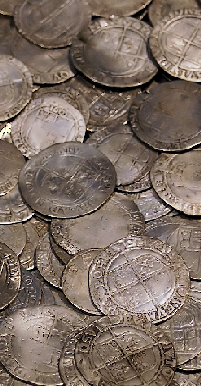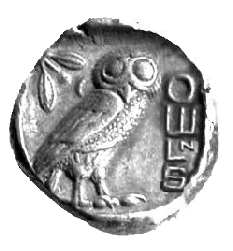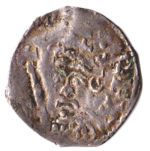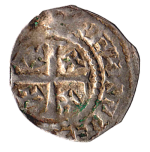● Next Meeting Status:
Cancelled
● Host Society for the
BANS 2011 Congress
held in Southport
An Imperial Tealby Penny of Henry II?
In 1158 a monetary reform was introduced in England which was of sufficient importance
for the contemporary chroniclers to record that 'a new money was made, which was
the sole currency of the kingdom.' This coinage is notorious for its ugly appearance,
bad craftsmanship and careless execution. It continued till 1180, and is named after
a large hoard which was found at Tealby, Lincolnshire, in 1807.

To collect Tealby pennies in the first place brands you as a little strange, to say
the least. As any student of early English coinage knows, the so-called 'Tealby'
coinage was probably the worst struck of any issue of coin of the realm. So much
so that it's considered a bonus to be able to make out the name of the moneyer, or
the mint, from the letters showing. The intriguing thing about the series is that
it is an enigma, every time. Yet to those of us who are fascinated by the coins'
irritating flatness and misleading shapes, every specimen grips the imagination and
poses the problem of correct identification from very little visual evidence.
Sometimes, a coin is already correctly identified when it lands in your collection.
Unfortunately, this can, for the real Tealby buff, take away some of the enjoyment
and the thrill of the hunt. An identified coin usually means that it has some sort
of pedigree, having passed through earlier collections - not always easy to trace,
but rewarding when you can. One such coin came my way back in 1981, bought from A
H Baldwin & Sons Ltd of London. It was a fairly common Tealby piece, being struck
at Norwich by the moneyer Reiner - a moneyer whom I did not have represented in my
collection at that time.

A few days after ordering the coin, it duly arrived, accompanied by the usual rather
briefly written Baldwin's ticket which simply stated:
TEALBY, NORWICH, bust D2, ]REINER[
However, on the reverse side of the ticket was the intriguing wording:
ex Russia - corrects BMC 681/3 (KAJ)
Taking the last wording first: KAJ simply meant that the coin had been checked over
by the late Kenneth Jacob, an expert on East Anglian mints; corrects BMC 681/3 -
well, this referred to the catalogue of the British Museum Collection where number
681-3, from the same dies as the Baldwin coin, had half the moneyer's name flatly
struck resulting in a misreading of the exact spelling. This coin was now able to
supply a correction to the information on the British Museum's ticket.

But what about ex Russia - what did this refer to? I phoned Baldwin's to find out
what information they had, and was quite amazed by what I was told. It would appear
that Baldwin's had bought a small parcel of miscellaneous hammered coins at a London
auction house back in the early 1920s. It was generally believed that the vendor,
a former Russian citizen, had acquired the coins during the October Revolution in
1917 - coins believed to have been looted from the Imperial Coin Cabinet of Tsar
Nicholas II!
How's that for provenance? Of course, the story cannot be proved, and I'm sure that
the present Russian government would have no interest in claiming the coin back on
behalf of the state. Yet I like to imagine the ill-fated Tsar poring over a small
collection of Tealby pennies with the same enthusiasm as myself. Maybe if he had
spent more time listening to the people's grumbles, instead of squinting at a misshapen
piece of twelfth century silver, the course of modern history might have been quite
different!
Alan M Dawson
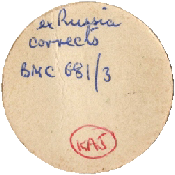
Hover your cursor to
see the coins in detail
